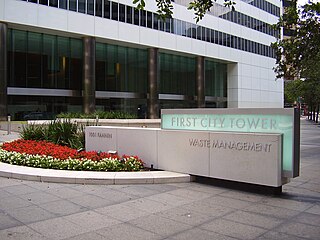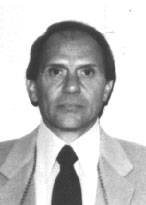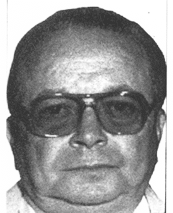
The Fresh Kills Landfill was a landfill covering 2,200 acres (890 ha) in the New York City borough of Staten Island in the United States. The name comes from the landfill's location along the banks of the Fresh Kills estuary in western Staten Island.
The Mobro 4000 was a barge owned by MOBRO Marine, Inc. made infamous in 1987 for hauling the same load of trash along the east coast of North America from New York City to Belize and back until a way was found to dispose of the garbage. During this journey, local press often referred to the Mobro 4000 as the "Gar-barge".

Waste collection is a part of the process of waste management. It is the transfer of solid waste from the point of use and disposal to the point of treatment or landfill. Waste collection also includes the curbside collection of recyclable materials that technically are not waste, as part of a municipal landfill diversion program.

Waste Management, Inc., doing business as WM, is a waste management, comprehensive waste, and environmental services company operating in North America. Founded in 1968, the company is headquartered in the Bank of America Tower in Houston, Texas.

Browning-Ferris Industries was a North American waste management company that was bought out in 1999.
James Galante is an American convicted felon and associate of the Genovese crime family, owner of the defunct Danbury Trashers minor-league hockey team and a defunct racecar team fielding cars for Ted Christopher, and ex-CEO of Automated Waste Disposal (AWD), a company that holds waste disposal contracts for most of western Connecticut and Westchester and Putnam counties in New York.
There is no national law in the United States that mandates recycling. State and local governments often introduce their own recycling requirements. In 2014, the recycling/composting rate for municipal solid waste in the U.S. was 34.6%. A number of U.S. states, including California, Connecticut, Delaware, Hawaii, Iowa, Maine, Massachusetts, Michigan, New York, Oregon, and Vermont have passed laws that establish deposits or refund values on beverage containers while other jurisdictions rely on recycling goals or landfill bans of recyclable materials.

Salvatore Avellino Jr., also known as "Sal" is an American mobster and former caporegime in the Lucchese crime family who was involved in labor racketeering in the garbage and waste management industry on Long Island, New York. Avellino also served as right-hand man and chauffeur to boss Anthony "Tony Ducks" Corallo.
Mario "the Shadow" Gigante was an American mobster in New York City who served as caporegime for the Genovese crime family. He was the elder brother of late family boss Vincent "The Chin" Gigante.

Allied Waste Industries, Inc. was a Fortune 500 company headquartered in Phoenix, Arizona. A vertically integrated company that owned and operated solid waste collection businesses, recycling facilities, and landfills, it was a leader in the solid waste industry in the United States. It served more than 10 million residential, commercial and industrial customers across 128 major markets in 37 states and Puerto Rico.
The Southeastern Public Service Authority (SPSA) is the solid waste management agency for the one-million-population region south of Hampton Roads Harbor and the lower James River in Virginia. Based in Chesapeake, Virginia, it services the independent cities of Chesapeake, Franklin, Norfolk, Portsmouth, Suffolk, and Virginia Beach and the counties of Isle of Wight and Southampton.

James "Jimmy Brown" Failla was an American mobster who was a high ranking caporegime with the Gambino crime family and a major power in the garbage-hauling industry in New York City. Failla's crew was based in Brooklyn, with operations stretching into Staten Island, Manhattan, and New Jersey.
Covanta Holding Corporation is a private energy-from-waste and industrial waste management services company headquartered in Morristown, New Jersey. Most of its revenue comes from operating power plants that burn trash as fuel. Covanta charges a fee for waste disposal, sells electricity produced in the process, and recovers metal for recycling.

Alphonse Malangone, legal name "Alfonso" and known as "Allie Shades," is a New York City-based mobster and former caporegime in the Genovese crime family. Malangone controlled the Genovese interests in the Fulton Fish Market, as well as being involved in pump and dump stock scams on Wall Street, and controlling Brooklyn's garbage hauling industry. He was a central figure in the book "Takedown: The Fall of the Last Mafia Empire" (ISBN 0-425-19299-7) an autobiography by NYPD officer Rick Cowan who went undercover for several years in the commercial garbage industry, posing as a family member of Brooklyn garbage company and eventually gaining access to the garbage cartel's organization, the Kings County Trade Waste Association. Cowen describes Malangone as the cagiest and most relatable of mobsters he dealt with.
Waste management in Japan today emphasizes not just the efficient and sanitary collection of waste, but also reduction in waste produced and recycling of waste when possible. This has been influenced by its history, particularly periods of significant economic expansion, as well as its geography as a mountainous country with limited space for landfills. Important forms of waste disposal include incineration, recycling and, to a smaller extent, landfills and land reclamation. Although Japan has made progress since the 1990s in reducing waste produced and encouraging recycling, there is still further progress to be made in reducing reliance on incinerators and the garbage sent to landfills. Challenges also exist in the processing of electronic waste and debris left after natural disasters.

The " Naples waste management crisis " is a series of events surrounding the lack of waste collection and illegal toxic waste dumping in and around the Province of Naples, Campania, Italy, beginning in the 1980s. In 1994, Campania formally declared a state of emergency, ending in 2008, however, the crisis has had negative effects on the environment and on human health, specifically in an area that became known as the triangle of death. Due to the burning of accumulated toxic wastes in overfilled landfills and the streets, Naples and the surrounding areas became known as the "Land of pyres". The crisis is largely attributed to government failure to efficiently waste manage, as well as the illegal waste disposal by the Camorra criminal organization.

Recology, formerly known as Norcal Waste Systems, is a waste management company headquartered in San Francisco, California. The company collects and processes municipal solid waste, reclaiming reusable materials. The company also operates transfer stations, materials recovery facilities (MRFs), a number of landfills, and continues to spearhead renewable energy projects. Recology is the largest organics compost facility operator by volume in the United States.
The Newby Island Landfill (NISL) is one of the largest active landfills on the shores of the San Francisco Bay. It is located in Santa Clara County, California in the United States. The site is located within the city limits of San Jose, California at the western terminus of Dixon Landing Road. The address is 1601 Dixon Landing Road, Milpitas. Although the address and public street access to the site are both in the City of Milpitas, the landfill property is entirely within the City of San Jose. Newby Island Landfill has a length of 5.07 km (3.15 mi). It is located West of the City of Milpitas near Dixon Landing Road and Interstate 880. It is the terminus for waste for all of San Jose (62%), Santa Clara (14%), Milpitas (10%), Cupertino (5%), Los Altos (2%) and other cities (7%). The 342-acre pile is currently permitted to operate until 2041 and may extend up to 245 feet. The landfill is an island surrounded by a levee which keeps its runoff from directly entering the bay, and the water that drains from it is treated in the landfill's own treatment plant. Electricity for the landfill is generated by burning the methane collected from the decomposition of the waste. Dried sewage sludge from the nearby San José–Santa Clara Regional Wastewater Facility is the material used as cover, mixed in with the trash, blending San Jose's waste streams. It is operated by Republic Services (Republic), which, along with Waste Management Incorporated, transports and disposes of most of the household trash in the United States.

GFL Environmental Inc. is a waste management company with headquarters in Toronto, Canada. GFL operates in all provinces in Canada, and currently employs more than 8,850 people. The company provides environmental services to municipal, residential, commercial, industrial and institutional customers. On July 6, 2021, the company announced the formation of the Resource Recovery Alliance (RRA) and an agreement to acquire Canadian Stewardship Services Alliance.
The Canada–Philippines waste dispute was an international row over mislabeled Canadian garbage shipped to Manila by a recycling company. The 103 shipping containers that left from Vancouver in 2013–14 were labeled as recyclable plastics; they instead contained household waste.